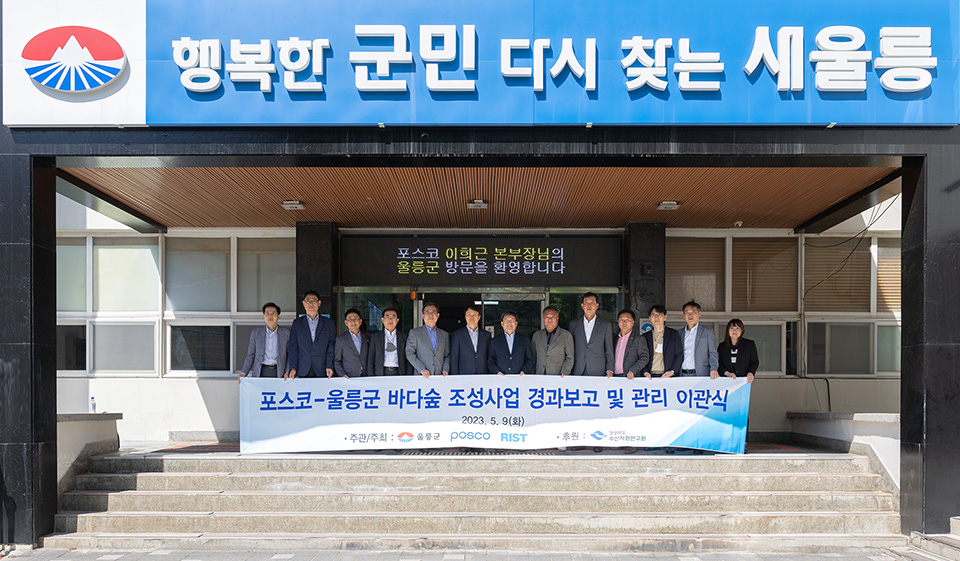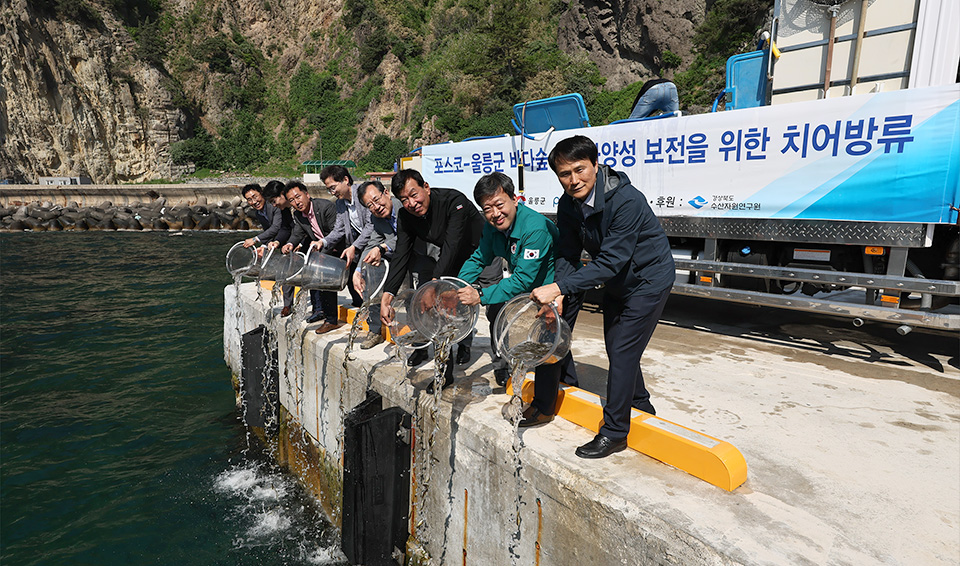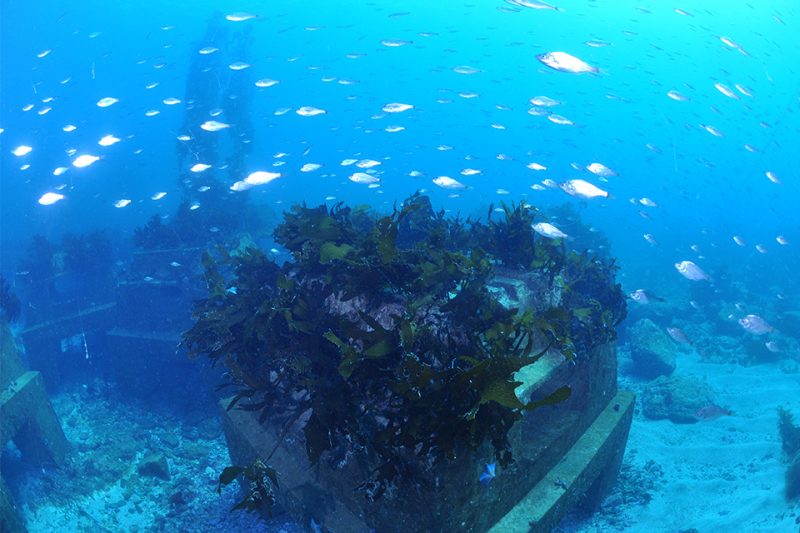Transfer of the sea forest, created by POSCO in Namyang-ri, Ulleungdo, to Ulleung-gun on the 9th
Establishment of the sea forest with 100% seaweed coverage through 3-year post-management of the artificial reef “Triton” installed in 2020
Expected to contribute to the restoration of marine ecosystem, conservation of biodiversity, and increase of fisherfolk income
On the 9th, POSCO transferred the ownership of the sea forest created in the Namyang-ri area in Ulleungdo to Ulleung-gun.
As the sea forest that POSCO created in Namyang-ri, Ulleung-gun, three years ago produced tangible results, such as seaweeds growing abundantly and juvenile fish swarming, its ownership was transferred to Ulleung-gun, the local government in charge. The transfer was made ahead of time to commemorate Ocean Arbor Day on May 10.
About 20 people attended the ceremony, including the Mayor of Ulleung-gun, Nam Han-kwon, Head of POSCO’s Safety & Environmental Division Lee Hee-geun, Director of the Environment & Energy Research Laboratory at the Research Institute of Industrial Science & Technology (RIST) Koh Dong-jun, Fishery Resources Development Institute of Gyeongsangbuk-do Province, and Namyang-ri’s fishing village chief and fisherfolk.
The results of the sea forest construction project were highlighted during the event, and 30,000 juvenile rock trouts, sponsored by the Fishery Resources Development Institute of Gyeongsangbuk-do Province, were released to the sea forest site. The fry released on this day were grown by the institute to recover fish resources and preserve the ecosystem, and healthy seeds were selected and provided after an infectious disease test.
Lee Hee-geun, POSCO’s Safety & Environmental Division Head, said, “POSCO will continue cooperation through utilizing our technology to contribute to the local community as a Corporate Citizen.”
“We feel encouraged because of POSCO’s interest in revitalizing Ulleungdo’s sea and improving the decline in fishery resources. We hope that regional cooperation projects will continue such as the creation of the Ulleungdo sea forest by POSCO, a Corporate Citizen, to protect the marine ecosystem,” said Ulleung-gun Mayor Nam Han-kwon.
In May 2020, POSCO installed 100 Tritons* and 750 Triton blocks underwater off Namyang-ri, southern Ulleungdo, creating a sea forest of about 0.4 ha. A hundred Tritons are installed at the edge of the sea forest to grow algae, and 750 Triton blocks are piled up like a mountain in the center to serve as fish habitats and spawning grounds.
*Triton: Triton, known as the god of the sea in Greek mythology, is an artificial reef brand made from POSCO’s steel slag. The Triton sea forest was first exhibited at the 2012 Yeosu Expo following the public-private cooperation between the Ministry of Maritime Affairs and Fisheries and POSCO and was introduced as Korea’s representative example of ecological restoration at the 2012 World Conservation Congress.
For the past three years, POSCO has been exceptionally managing the sea forest, including regular ecological monitoring and seaweed transplantation. In September 2020, powerful typhoons Maysak and Haishen hit Ulleungdo consecutively, causing significant damage, including the loss of most of the transplanted seaweed on the artificial reefs. However, through subsequent efforts focused on restoration, including the experimental application of newly developed marine fertilizers by RIST, the successful establishment of a sea forest with 100% seaweed coverage was achieved in March of this year.
In particular, through the creation of the sea forest in Ulleungdo, the biomass of seaweeds such as Ecklonia and Sargassum in the Namyang-ri sea forest increased more than 40 times compared to the initial period of creation, and the number of seaweed species increased from the initial 10 species to more than 18 species. In addition, numerous schools of fish, such as rock bream, damselfish, and rockfish, are inhabiting the area, proving various ecological restoration effects.
Steel slag, the primary material of Triton used by POSCO in the sea forest, has a higher mineral content, including calcium and iron, which help the marine ecosystem more than general aggregates and promote algae growth and photosynthesis. It restores fishery resources in the damaged marine ecosystem in a short period and contributes to preserving biodiversity.
Furthermore, POSCO’s endeavors in preserving marine ecosystems through the creation of the Triton sea forest have received acknowledgment. On April 30th, the company was honored as the first Asian recipient in the Eco-Innovator category at the International Corporate Citizenship Conference (ICCC) on April 30, held by the Boston College Center for Corporate Citizenship.
In the future, POSCO plans to promote the restoration of the marine ecosystem and increase fisherfolk income through activities such as creating sea forests with Triton and developing eco-friendly sea fertilizer with steel slags.

▲ POSCO and Ulleung-gun held a sea forest transfer ceremony at Ulleung-gun Office on the 9th.

▲ POSCO and Ulleung-gun are releasing fry to preserve biodiversity in the sea forest.

▲ Triton formed by algae and fishery
